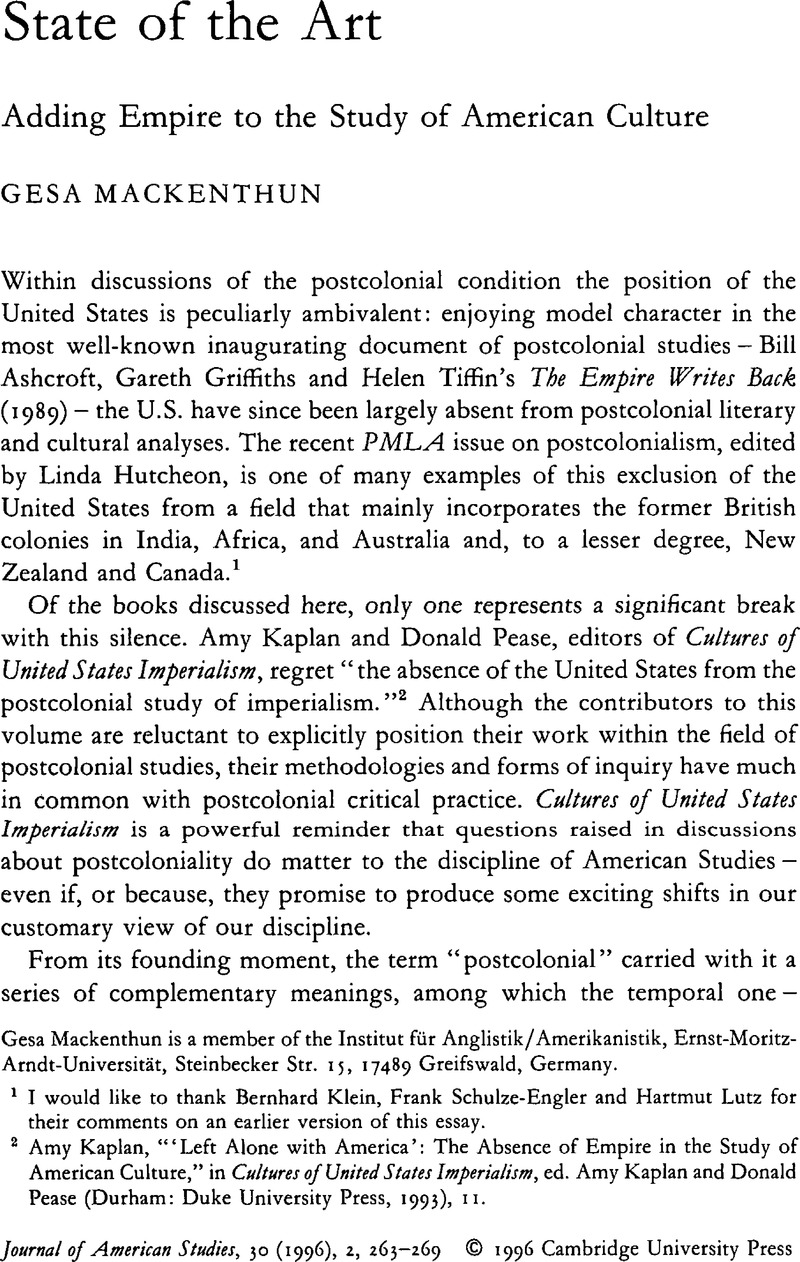Published online by Cambridge University Press: 16 January 2009

1 I would like to thank Bernhard Klein, Frank Schulze-Engler and Hartmut Lutz for their comments on an earlier version of this essay.
2 Kaplan, Amy, “‘Left Alone with America’: The Absence of Empire in the Study of American Culture,” in Cultures of United States Imperialism, ed. Kaplan, Amy and Pease, Donald (Durham: Duke University Press, 1995), 11Google Scholar.
3 Hulme, Peter, “Including America,” Ariel 26 (1995), 117–23Google Scholar.
4 Buell, Lawrence, “American Literary Emergence as a Postcolonial Phenomenon,” American Literary History 4 (1992), 435CrossRefGoogle Scholar.
5 Cheyfitz, Eric, “Savage Law: The Plot Against American Indians in Johnson and Graham's Lessee v. M'Intosh and The Pioneers,” in Cultures of United States Imperialism, ed. Kaplan, and Pease, , 118Google Scholar.
6 Hulme, “Including America,” 122.
7 Ashcroft, Bill, Griffiths, Gareth, Tiffin, Helen, The Empire Writes Back: Theory and Practice in Post-Colonial Literatures (London: Routledge, 1989), 16CrossRefGoogle Scholar.
8 Cf. Gesa Mackenthun, “Captives and Sleepwalkers: The Ideological Revolutions of Post-revolutionary Discourse.” Paper presented at the 6th Biennial Symposium of the Milan Group in Early United States History (1992) and Maddox, Lucy, Removals: Nineteenth-Century American Literature & the Politics of Indian Affairs (Oxford: Oxford University Press, 1991)Google Scholar.
9 Kaplan, op. cit; cf. Mackenthun, Gesa, Metaphors of Dispossession: American Beginnings and the Translation of Empire, 1492–1637 (Norman: University of Oklahoma Press, forthcoming 1997)Google Scholar, Introduction.
10 Miller, Perry, Errand into the Wilderness (Cambridge: Harvard University Press, 1956), viii, ixGoogle Scholar.
11 Kaplan, 17. Cf. Gura, Philip F., “The Study of Colonial American Literature, 1966–1987: A Vade Mecum,” William and Mary Quarterly 45 (1988), 305–41CrossRefGoogle Scholar and Mackenthun, Gesa, “Vom Nutzen und Nachteil historischer Anfänge in den Early American Studies,” Amerikastudien/American Studies 38 (1993), 223–36Google Scholar.
12 Young, Robert, Colonial Desire: Hybridity in Theory, Culture and Race (London: Routledge, 1995), 25Google Scholar. Cf. Horsman, Reginald, Race and Manifest Destiny: The Origins of American Racial Anglo-Saxonism (Cambridge: Harvard University Press, 1981)Google Scholar.
13 Young, 179.
14 This idea is shared by Orr, Bridget, “‘The Only Free People in the Empire’: Gender Difference and Colonial Discourse,” in De-Scribing Empire, ed. Tiffin, Chris and Lawson, Alan (London: Routledge, 1994), 152–68Google Scholar.
15 White, Jonathan, “Introduction,” in Recasting the World: Writing after Colonialism, ed. White, Jonathan (Baltimore: Johns Hopkins University Press, 1993), 2Google Scholar.
16 Ibid., 1.
17 Pechey, Graham, “Post-apartheid narratives,” in Colonial discourse/postcolonial theory, ed. Barker, Francis, Hulme, Peter, and Iverson, Margaret (Manchester: Manchester University Press, 1994), 153Google Scholar.
18 Phillips, Jerry, “Educating the Savages: Melville, Bloom, and the Rhetoric of Imperialist Instruction,” in Recasting the World, 31, 33Google Scholar.
19 Keenan, Sally, “‘Four Hundred Years of Silence’: Myth, History, and Motherhood in Toni Morrison's Beloved,” in Recasting the World 79Google Scholar n.
20 Quoted in Hulme, Peter, “The Profit of Language: George Lamming and the Postcolonial Novel,” in Recasting the World 120Google Scholar.
21 Kutzinski, Vera, “Commentary: American Literary History as Spatial Practice,” American Literary History 4 (1992), 555CrossRefGoogle Scholar.